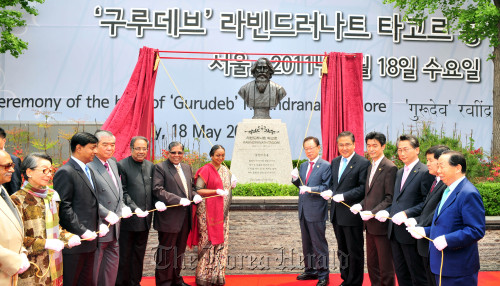Seventy years after his death, Indian Poet Rabindranath Tagore will stand proud in a country he never visited ― one he had described as the “The Lamp of the East.”
Years before Korea was freed from Japanese colonial rule, Tagore, a literary genius and champion of human freedom and dignity, prophesied the future of the Peninsula.
In 1929, Tagore predicted in his famous poem “The Lamp of the East,” that it would not be long before Korea rises again like a star among the comity of nations.
As India celebrates the 150th anniversary of Tagore’s birth, it worked with Korea to install a bronze bust of the poet on Daehangno’s main street.
Years before Korea was freed from Japanese colonial rule, Tagore, a literary genius and champion of human freedom and dignity, prophesied the future of the Peninsula.
In 1929, Tagore predicted in his famous poem “The Lamp of the East,” that it would not be long before Korea rises again like a star among the comity of nations.
As India celebrates the 150th anniversary of Tagore’s birth, it worked with Korea to install a bronze bust of the poet on Daehangno’s main street.

“This brings the two countries closer and generates feelings of brotherhood not only between the people of India and Korea, but also among those peoples who had the unfortunate experience of colonial rule,” said Indian Ambassador Skand R. Tayal.
The 1.2 meter-tall metal masterpiece was carved by Indian sculptor Gautam Pal and was given as a gift to Korea by the government and people of India.
“The prophetic poem, ‘The Lamp of the East,’ which is engraved in stone on the pedestal of the statue, will last an eternity,” said Tayal.
India’s Speaker of Parliament Lok Sabha told The Korea Herald that she was touched by the connection both countries share over the Bengali poet’s work.
“The statue of Tagore goes beyond symbolism into the realm of shared experiences and values of our two countries,” she said.
India, in the 19th and 20th centuries was in the forefront of the anti-colonial struggle and was in solidarity with Korea’s own fight against imperialism and foreign occupation, she explained.
Tagore was also the first non-European to be awarded the Nobel Prize for Literature in 1913.
His poetry is spiritual and his persona gave him a prophet-like aura in the West.
“Tagore was a strong moral and spiritual force behind the anti-imperialist movement,” she said. “If India and Korea are vibrant democracies and liberal societies today, we owe this in no small measure to inspiring personalities like Tagore.”
After gaining independence from Japan in 1945, the poem was so popular in Korea that it was included in high school textbooks.
Korea’s first lady Kim Yoon-ok gave the first Tagore Literature Awards to eight Indian writers during President Lee Myung-bak’s trip to India in early 2010.
“This is a permanent symbol of Tagore’s love and admiration for Korea and the people of Korea, and will be a constant reminder to passersby of India-Korea Friendship,” said Tayal.
(yoav@heraldcorp.com)











![[Today’s K-pop] BTS pop-up event to come to Seoul](http://res.heraldm.com/phpwas/restmb_idxmake.php?idx=644&simg=/content/image/2024/04/17/20240417050734_0.jpg&u=)




![[KH Explains] Hyundai's full hybrid edge to pay off amid slow transition to pure EVs](http://res.heraldm.com/phpwas/restmb_idxmake.php?idx=652&simg=/content/image/2024/04/18/20240418050645_0.jpg&u=20240419100350)

